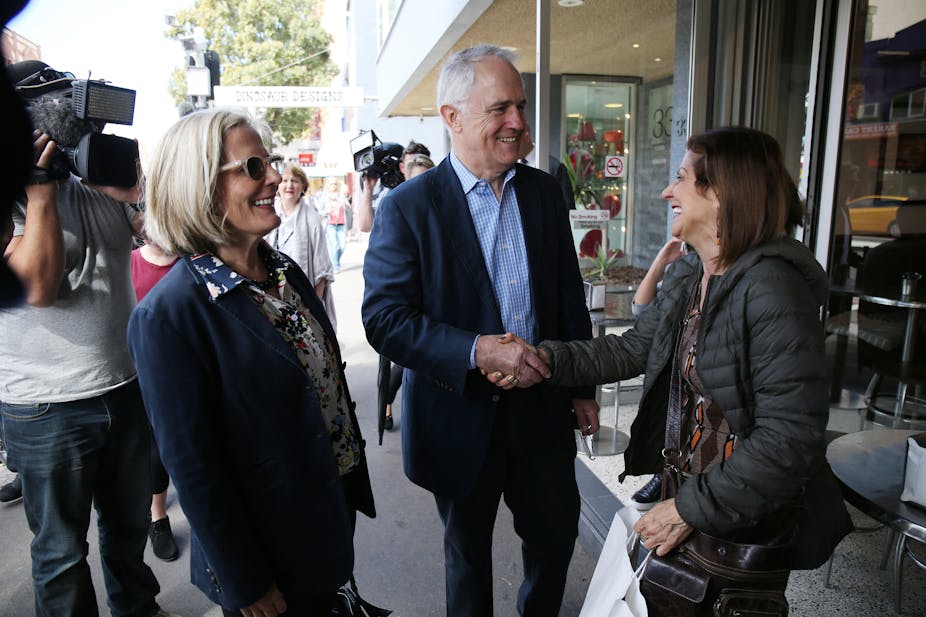The polling sends a strong message: Malcolm Turnbull starts his prime ministership with people wanting to think the best of him.
Essential has found people believe Turnbull is intelligent (81%), hardworking (71%), a capable leader (70%) and understands the problems facing Australia (63%). When he and Bill Shorten are compared, Turnbull enjoys the greatest margins over the opposition leader in being a capable leader (34 points), good in a crisis (26 points), visionary (25 points), and intelligent (23 points).
It’s a very different picture from the June poll that found Tony Abbott’s key attributes to be out of touch with ordinary people (65%), narrow-minded (63%), arrogant (62%) and hardworking (59%).
But as Turnbull enjoys his honeymoon, which is also seeing a rise in consumer confidence, he might note that the poll bounce he has brought, while significant, has not taken the government into a big lead in two-party terms. In Newspoll the Coalition is ahead 51-49%; in Essential, government and opposition are on 50-50%.
Many voters are delighted to see the back of Abbott but quite a few, though liking Turnbull, will be waiting to get a better handle on his plans and his ability to deliver them.
Time is short between now and the election, even if the government goes full term. Turnbull has to make choices about the number of battles he takes on.
Special Minister of State Mal Brough has landed Turnbull early in one difficult dogfight with his declaration about taking on reform of the Senate voting system, which would curb microparties.
Announcing his intention after he was sworn in on Monday, Brough pressed it on Tuesday and said he would like to see changes in time for the election.
The mood of a number of the non-Green crossbenchers rapidly switched from benign to angry. They had been encouraged by Turnbull’s reaching out in their direction; now they saw his minister coming at them.
The Motoring Enthusiast Party’s Ricky Muir declared that “any reform, no matter how it is sold to the people, is nothing more than a power grab to protect the major parties”.
Independent Glenn Lazarus also sees it as a bid for control. He said that while he was happy to look at changes, he would have thought the Turnbull government would have wanted to see how it could work with the present Senate.
Liberal Democrat David Leyonhjelm was blunt. “One of the weaknesses of the Abbott government was its inability to negotiate with the Senate crossbench. We can only hope that Mr Brough’s comments were a brain-fart, because he seems to be intent on wrecking this relationship with the Turnbull government before it begins. I have more faith in Mr Turnbull’s negotiation skills than Mr Brough and remain optimistic that a Turnbull government will perform better in this regard.”
Clive Palmer, who is himself in the House of Representatives and whose Palmer United Party now only has a single senator, Dio Wang, said the government was playing with fire if it did not think there would be some sort of reaction from the crossbench. He plans to write to Turnbull about the issue and request a formal meeting “because it goes to the heart of our democracy”.
The push for change has been driven by concern over the system being “gamed” by elaborate preference deals, which means much power can land in the hands of people elected on hardly any votes.
Reform has been recommended by the parliamentary committee on electoral matters. It proposed abolition of group voting tickets, exploited for “gaming” through preference arrangements, and the introduction of optional preferential voting for the Senate.
Talks have been held between the government and Labor about the possibility of a deal for legislation before the election. But it seems unlikely the government will be able to get an agreement with the opposition, which is divided.
Shadow Special Minister of State Gary Gray favours change but key Labor figures in the Senate, including the NSW right’s Sam Dastyari, are opposed. Dastyari told The Conversation on Tuesday: “Senate electoral reform as currently proposed is an unequivocally bad idea for the centre left. It’s nothing more than a conservative power grab”.
The Parliamentary Library says that predicting the electoral outcomes from changes to the voting system is difficult. “It would almost certainly eliminate the situation where a candidate is elected on a very small vote, but would be unlikely to prevent smaller parties with a reasonable constituency being successfully elected.”
The library says changes proposed by the parliamentary committee “would return the Senate voting system to a much more proportional system, where the makeup of the Senate more closely represented the votes of the electorate, but would also remove much of the element of surprise that has characterised Senate elections in recent years”.
If the government cannot reach agreement with Labor, the political cost of pursuing Senate voting reform becomes much higher. It would be possible to partner with the Greens, who favour change, but the government is dubious about such an alliance.
If the reform were owned by the major parties, objections to it would get more limited attention. Without “cover” from Labor, the government would find itself more exposed to charges of trying to suppress minority voices, and it would take all the angst from the angry crossbenchers.
But if nothing is done and microparties continue to proliferate, Senate ballot papers will become physically unmanageable and results will continue to be a preference lottery rather than a reflection of voters’ intentions.
Brough told The Conversation on Tuesday night that he wasn’t wedded to a specific model for change. He had spoken with a number of crossbenchers during the day. “We need to have a conversation with everyone,” he said. “We need to bring everyone along with this.”

